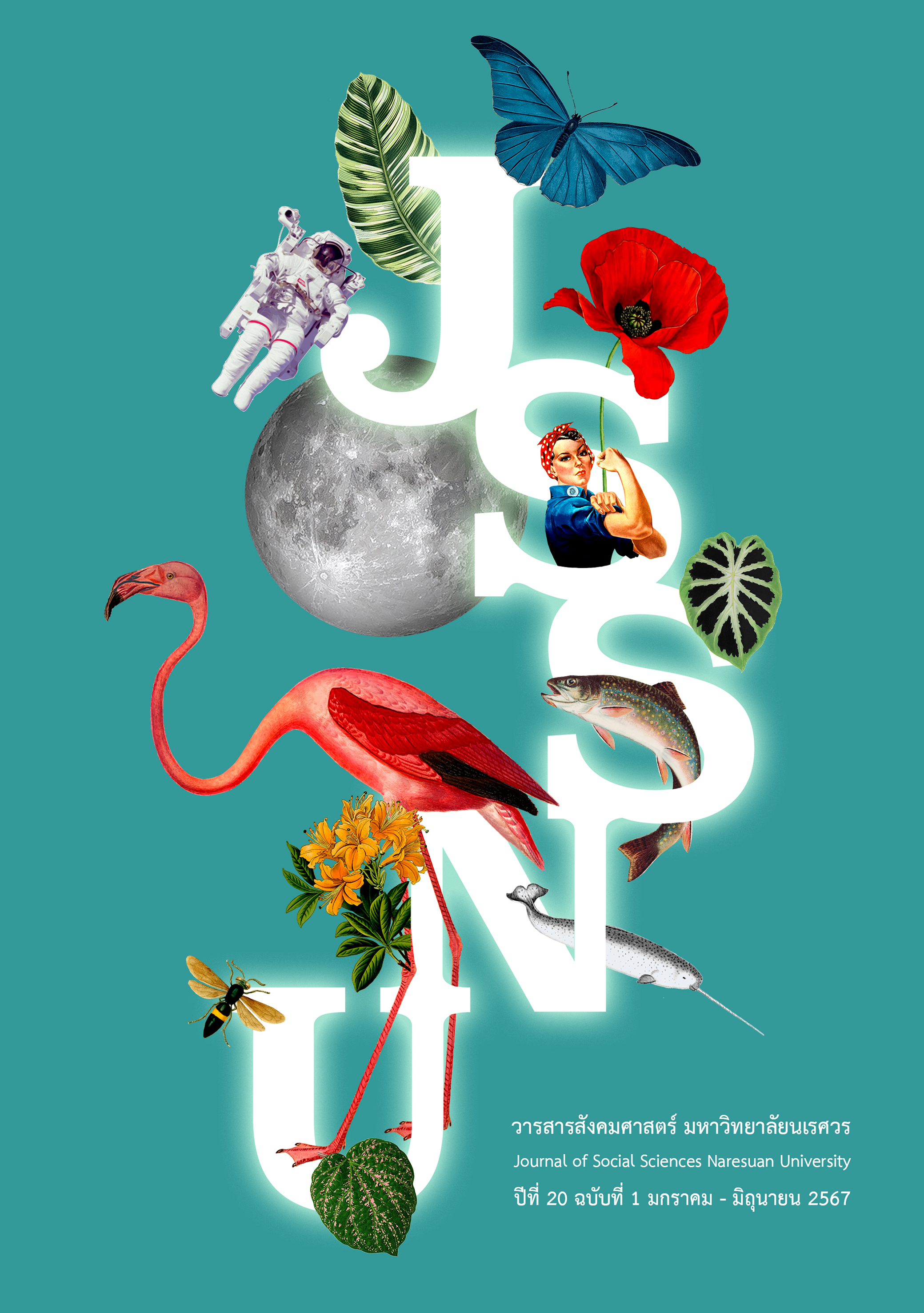Headless Mountain: Poverty Traps Associated with a Long-standing Fight Against Stone Mining of the Khaolaoyai-Phajandai Conservation Group
Main Article Content
Abstract
This paper analyzes key issues related to Khaolaoyai-Phajandai Conservation Group’s long-standing battle against stone mining capitalism. It presents 10 case studies by using a qualitative research method. The study found that their nearly 30-year opposition against the mining management policy has trapped themselves in cross-generational poverty, especially those from poverty-stricken and fragile households due to the deterioration of natural resources producing their food security. They have also lost chances for seeking income and time to care for family members. Having lost their family heads through assassinations has even more reduced their potential to overcome poverty, while giving in to the mining encroachment make them suffer from explosions and indented head of the mountain. This mountain is the symbol of “this place”, having long represented their presence and community identities, which have been being destroyed. Their emotional distress has become a crux of social suffering that is intertwined with economic distress, all of which have already been transmitted across at least three generations.
Downloads
Article Details

This work is licensed under a Creative Commons Attribution-NonCommercial-NoDerivatives 4.0 International License.
References
Burusratanaphund, W. (2006). Kansueksa kan phatthana prathet mong phan kan chai sapphayakonthammachat samai ratchakan thi 5 kap samai patchuban: Mueangrae (in Thai). [The study of country development through natural resource use in King Rama 5 and the modern period: Mining]. (Research report). Bangkok: Thai Khadi Research Institute Thammasat University.
Chanchara, S., Pongjapo, N., & Tipnet, N. (2016). Phonkrathop khong ngoen longthun phak ekkachon thi mi raidai lae kan changngan khong phaktawan-ok chiangnuea (in Thai). [The impact of private investment on the income and employment of the northeast: The analysis of input and output model]. SNRU Journal of Science and Technology Journal, 8(3), 326-336.
Chuengsatiansup, C. (1999). Sense, symbol, and soma: Illness experience in the soundscape of everyday life. Culture, Medicine and Psychiatry, 23(3), 273-301. doi: 10.1023/a:1005556026679
Das, V. (1999.) Critical events: An anthropological perspective on contemporary India. New York: Oxford University Press.
Davidson, J., & Milligan, C. (2004). Embodying emotion sensing space: Introducing emotional geographies. Social & Cultural Geography, 5(4),523-532. doi:10.1080/1464936042000317677
Department of Primary Industries and Mines. (2022). Khomun mueangrae hin utsahakam (in Thai). [Industrial stone mining information]. Retrieved September 5, 2022, from http://www.dpim.go.th/2561
Farmer, P. (2009). On suffering and structural violence: A view from below. Race and the Global Politics of Health Inequity,3(1), 11-28.
Hall, S. (1977). Representation: Cultural representations and signifying practices. London: SAGE Publications.
Hengsuwan, P. (2021). Phuying rusuek pai rusuek: Kan Chuangching phuenthi arom khong phuprakopkan satri lae kan thongthiao naeo satri niyom. [Women feel, Pai feels: The space contestation of emotions of female operators and the feminist-approach tourism]. In A. Ganjanapan (Ed.), Siang thi mai daiyin arom lae khwamwang nai phuenthi khwamru (in Thai). [Unheard voices, emotion and hope in the knowledge space]. (pp. 141-202). Chaing Mai: Wanida Karnpim.
Kleinman, A., Das, V., & Lock, M. (Eds.). (1997). Social suffering. Berkeley: University California Press.
Krongkaew, M., & Chordsiri, J. (1975). Kan wat radap khwam yakchon nai prathet thai (in Thai). [Poverty measurement of Thailand]. Thammasat Journal, 5(1), 48-68.
Lefebvre, H. (1991). The production of space (D. Nicholson-Smitch, Trans.). Malden, MA: Blackwell.
Lewis, O. (1969). The culture of poverty. In D. P. Moynihan (Ed.), On understanding poverty: Perspectives from the social sciences (pp. 187-200). New York: Basic Books.
Manorom, K. (2022). Khwam yakchon kham run nai sangkhom thai phaitai khwam thathai choeng khrongsang (in Thai). [The Intergenerational Transmission (IGT) of poverty in Thai Society under structural challenges]. (Research proposal). N.P.: n.p.
Meesook, O. A. (1979). Income, consumption, and poverty in Thailand, 1962/63 to 1975/76. Washington, D.C.: World Bank Group.
Office of the National Economics and Social Development Council. (2021). (Rang) Phaen phatthana setthakit lae sangkhom haeng chat chabap thi 13 (in Thai). [(Draft) The Thirteenth National Economic and Social Development Plan]. Retrieved October 15, 2022, from https://www.nesdc.go.th/download/Plan13/Doc/Plan13_DraftFinal.pdf
Office of the National Economics and Social Development Council. (2022). Phaen Phatthana setthakit lae sangkhom haeng chat (Chabap Thi 13) Phoso 2566-2570) (in Thai). [The thirteenth national economic and social development plan (2023-2027)]. Retrieved April 11, 2022, from https://www.nesdc.go.th/article_attach/article_file_20230307173518.pdf
Reangnoong, S., Somseang, T., Suwanson, P., Pidsayatang, T., Phola, B., Penglee, S., …Pongsriri, S. (2016). Rupbaep kan phatthana sakkayaphap lae botbat khong yaowachon nai kan chatkan pa chumchon phaitai sathanakan yaengching sapphayakon chumchon pha son chok chai tambon dong mafai amphoe suwannakhuha changwat nong bua lam phu (in Thai). [Patterns of potential development and roles of youths in forest management under resource conflict of the Pha Son-Chokchai Dong Mafai Sub-District Suwannakhuha District Nong Bua Lam Phu Province]. (Research report). Bangkok: The Thailand Research Fund.
Tanabe, S. (2008). Chumchon kap kan pokkhrong chiwa yan: Klum phu tit chuea HIV nai phaknuea khong thai (in Thai). [Community and governmentality: HIV/AIDS self-helped groups in northern Thailand]. (Research report). Bangkok: Health Systems Research Institute (HSRI).
Thanawattanawong, C. (2014). Kan kha phunam nai khwamkhatyaeng dan sapphayakon thammachat lae singwaetlom korani sueksa sapphayakon raethat phaktawan-ok chiangnuea prathet thai (in Thai). [Killing the leaders in environmental conflicts: Case studies of mineral industries in Northeastern, Thailand]. (Doctoral dissertation). Bangkok: Thammasat University.
Wisetpholchai, B. (2015). Apsara klang fai: Attawisai phuenthi lae prasopkan phatsa nai chiwit pracham wan khong phuying ba chao kamphucha (in Thai). [Apsara’s ordeal of fire: Subjectivity, space, and sensory experience in everyday life of Cambodian bar girls]. (Doctoral dissertation). Bangkok: Thammasat University.
Yaowalert, H. (2014). Rai-ngan kansueksa botbat phak prachachon nai kan tosu phuea raksa sitthi nai kan mi suanruam nai kan chatkan sapphayakonthammachat (in Thai). [Report of the study of the roles of civil society in flighting for rights in participation in natural resource management]. (Research report). Bangkok: Sub-commission for the study and investigation of mining problems in National Human Rights Commission of Thailand.


